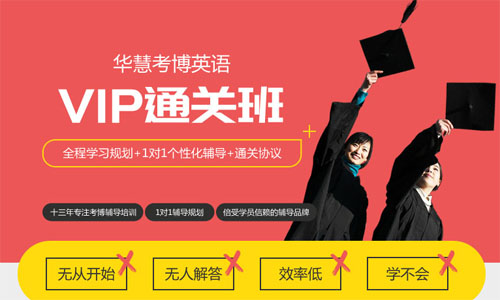医学阅读理解高分必备技能之一:速读文章
华慧考博老师通过多年的辅导发现,备考全国医学考博英语统一考试的过程中,短期内最容易提升的是阅读理解题型:只要具备一定的英语基础,即词汇和语法过关,通过训练做真题,这部分拿到相对较高的分并不是难事。阅读理解做题,基本有三个环节:1.读 题干:问题类型,关键信息(以便定位)
2. 速读文章(化繁为简):句子→ 段落 → 文章思路和主旨
3. 答题:定位 → 比对 → 确定最佳答案
一般看题干不超过1分钟,速读文章5分钟左右,答题平均一题一分钟共5分钟,一篇阅读用时11分钟。而综合学员们的表现发现,这三个环节中,最需要训练的是第二个,很多人无法做到在5分钟左右理清楚文章的思路和主旨。而其原因一小部分是因为单词量太少,大多是因为不习惯这么多阅读文章,没有把文章看做一个有机整体,缺乏逻辑思维,割裂句子和句子之间的关系,不管段落和段落之间的关系,没有意识标记重点信息。备考中一定要突破这个问题,有目的地训练边看边思考,化繁为简,适当做标记。提高速读文章的能力需要把握以下几个要点:
一、快速把握句意。尤其是长难句的大意,不需要过分仔细在意细节内容,把握大致逻辑意思即可。一篇文章一般是三四百词,大约十几二十个句子,整体阅读速度要提升,首先必须提高单句的理解速度。提高单句的理解速度,重点在于句子的结构,这一点在此不再赘述,相信各位做阅读之前都训练过长难句。
这里需要指出的是,偶尔碰到一时间“卡壳”的句子,也无需惊慌,只要你明白这个句子的功能是什么就可以,甚至就算不知道也没关系,也不一定就考到这个句子,就算考到了,做题的时候再定位回来一般也都不是问题了。切记,咱们不是要细读每一个句子,而是要通过大致了解句意去把握段落。
二、快速把握段意。一个段落往往有几个句子构成,句子之间一定有逻辑联系,通过句子之间的逻辑,可以帮助快速有效概括段意。一般比较长的段落通常是总分(总)结构,往往会有中心句,学会区分中心和细节,能帮助快速理解段意,提高阅读速度。而一些短小的段落,可能就没有所谓的中心句,但可以根据一些关键的实词和表示逻辑关系的词快速把握句子之间的关系,从而概括段意。
三、有意识地把握文章行文思路。也就是要串联段落之间的逻辑关系。通过分析历年真题的文章发现,一般来说,医学阅读理解的文章通常是逻辑比较清楚的完整的篇章,基本遵守这样的行文思路的逻辑:提出话题——展开话题——对比总结展望。
当然,做题的第一步是先看了题干的,因此题干的一些关键信息,在读文章的过程中遇到了可以先做个记号,但不建议停下来做题,等整体读完文章再做题,往往正确率更高。
下面华慧考博老师以2006年真题的第五篇文章为例来讲一下行文思路和重点信息。这种段落较多是历年非常典型的文章,这种文章看似松散实则逻辑非常清晰。
Several classes of bitter citrus compound have looked promising as anticancer agents in laboratory tests. A new study indicates that long-term consumption of orange juice, a source of such chemicals, cuts cancer risk in rats.
In test-tube studies, one class of the bitter compounds-flavonoids -has inhibited the growth of breast cancer cells. Related studies showed that bitter citrus limonoids similarly ward off cancer in animals. Mulling over such data, Maurice R Bennink of Michigan State University in East Lansing wondered whether drinking orange juice would have a beneficial effect.
His team injected 60 young rats with a chemical that causes colon cancer and then raised half of the animals on a normal diet. The others received orange juice instead of drinking water-and less sugar in their food to compensate for sugars in the juice.
At an American Institute for Cancer Research meeting last week in Washington D.C.. Bennink reported that after 7 months 22 of the animals receiving a normal diet had developed colon cancers. Only 17 of the rats on the orange-juice diet showed tumors. That’s 77 percent of the control group’s incidence.
Concludes Bennink, whose work was supported by orange-juice producer Tropicana products of Brandenton, Fla, “These data show orange juice helps protect against cancer”,He says that the study might also apply to breast, prostate,and lung cancers.
Bandaru S.Reddy of the American Health Foundation in Valhalla.N.Y.,was not surprised by Bennink’s finding of an orange juice benefit. However,he calls the reported risk reduction. unimpressive, his own data show that citrus limonoids protect against chemically induced colon cancer in lab animals.
Luke K. T. Lam of LDT Laboratories in St. Paul,Minn., finds Bennink’s data“quite interesting”, although he describes as “borderline” the suppression of cancer incidence observed by Bennink. Lam has inhibited tumors in the lung, skin and forestomach of mice with limonoinds.
The scientists don’t know what compounds in orange juice underlie its effect. The juice is rich in one limonoid--a sugar-containing version of limonin, which suppressed tumors in Lam’s rich in one experiments. It’s possible, Lam speculates, that rats convert the juice’s limonoid into limonin.
Indeed argues Gary D. Manners of the Agricultural Research Service in Albany, Calif. “there is no doubt that these( anticancer) citrus compounds are bioavailable in animals to the site of a cancer. The question remains whether they are similarly available in people”. To find out,his team will soon begin measuring the human boy’s uptake of limonoids from orange juice.
81. What made Bennink hypeothesize the protective effect of orange juice?
A. The wide consumption of the fruits
B. the citrus limonoids of the fruits
C. His own personal experience.
D His promising research ~fv3+_syJW
82.Which of the following is true of the results of Bennink’s study?
A. only eight rats of the control group showed tumors
B. thirteen rats of the test group failed to show tumors
C. seventy-seven percent of the test group did not show tumors
D.only thirty-three percent of the control group showed tumors
83. It can be inferred from the passage that Bennink___ .
A. won much financial support with his unexpected results.
B. had a commercial intention in the first place aO?We
C. tried to please orange-juice manufacturers
D. found a right sponsor
84. Both Reddy and Lam___.
A. seemed to be surprisingly impressed by Bennink’s findings
B. did not seem to be surprised by Bennink’s findings
C. did not seem to believe in the orange juice benefit
D. seemed to be doubtful of Bennink’s findings
85.From the passage we can learn that scientists are still in the dark about___
A. the substance that suppresses tumors
B. the existence of bioavailability in the human body
C. the uptake of limonoids from orange-juice in people bv6Knvr
D. the bioavailability of citrus compounds in the human body.
读完题干之后,大致了解一些关键信息,并预测了文章可能的内容:Bennink应该做了某项研究,然后有另外两个人对其有所看法等。
快速读文章的过程中,已将重要信息予以标出。文章的行文思路如下:
第(1)段提出话题:A new study
第2~7段阐述此项研究:
(2)研究背景、假设
(3)实验设计
(4)实验数据
(5)得出结论
(6)和(7)其他两位科学家对此研究结构的看法
第8~9段总结展望:
(8)作用的机制
(9)核心问题点
更多考博经验以及考博真题请大家关注华慧考博:www.hhkaobo.com 全国专业考博英语辅导机构。及时为大家更新全国各大院校博士招生简章,收集完善各院校考博英语真题、考博专业课真题等重要考博讯息。专业考博英语辅导团队精心为您打造考博英语复习计划,助力广大考生顺利登岸!

点击查看详情:
gt;【通用】2021年考博英语辅导VIP通关班【直播+录播】 -1对1个性化辅导(15次)









